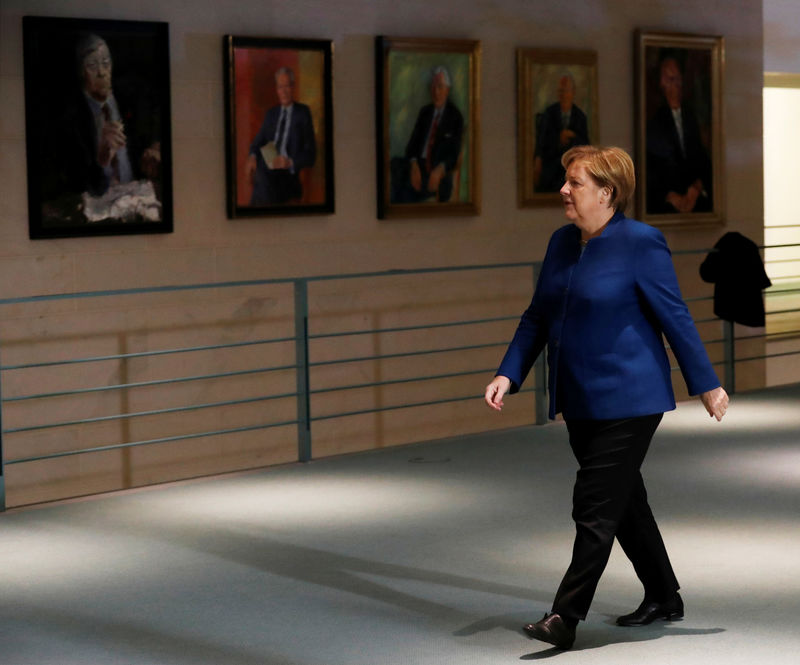Street Calls of the Week
Investing.com - Signs of progress in trade talks between the United States and China is likely to be the main driver of sentiment this week, as the world's two largest economies agreed to a ceasefire in their longstanding trade dispute.
Tensions between the two economic superpowers have dominated headlines for most of the year, with both sides imposing tit-for-tat tariffs on each other's products. The standoff had raised fears among investors that the global economy could be dragged down by the dispute.
Meanwhile, market players will focus on this week's Organization of Petroleum Exporting Countries (OPEC) meeting in Vienna, amid widespread expectations that major producers would agree some form of production cut in an effort to stave off a global glut in supplies.
There will also be important testimony on the economy and monetary policy from Federal Reserve Chair Jerome Powell, who appears Wednesday before a congressional panel.
Comments from the Fed chair sent global stocks soaring last week, when he appeared to suggest that the central bank may be nearing an end to its three-year long rate-tightening cycle.
Several important economic reports are also expected, with the monthly U.S. jobs report on Friday topping the list.
U.S. markets will remain closed on Wednesday after President Donald Trump designated it as a national day of mourning in remembrance of former President George Herbert Walker Bush, who died Friday at the age of 94.
Elsewhere, in what will be a quiet week for European economic data, investors will focus on a report on activity in the UK's dominant services sector for further indications on the health of the British economy.
Political headlines will also be in focus as investors watch developments surrounding Brexit.
Ahead of the coming week, Investing.com has compiled a list of the five biggest events on the economic calendar that are most likely to affect the markets.
1. U.S.-China Trade Talks
U.S. President Donald Trump and Chinese President Xi Jinping agreed to hold off on slapping additional tariffs on each other's goods following high-stakes talks at the G20 Summit in Argentina on Saturday.
Trump will leave tariffs on $200 billion worth of Chinese imports at 10% at the beginning of the new year, agreeing to not raise them to 25% "at this time", the White House said in a statement.
Meanwhile, "China will agree to purchase a not yet agreed upon, but very substantial, amount of agricultural, energy, industrial, and other product from the U.S. to reduce the trade imbalance between our two countries. China has agreed to start purchasing agricultural product from our farmers immediately," the White House said.
American and Chinese officials will continue to negotiate lingering disagreements on technology transfer, intellectual property and agriculture over the next 90 days, but if this does not happen then the 10% tariffs will be raised to 25%, it added.
The announcements came after Trump and Xi sat down with their aides for a working dinner at the end of a two-day gathering of world leaders in Buenos Aires.
2. OPEC Meeting
Oil ministers from OPEC, Russia and other major producing countries will meet in Vienna on Thursday and Friday to decide on production policy for the next six months.
OPEC officials have been making increasingly frequent public statements that the cartel and its partners would start withholding crude in 2019 to tighten supply and prop up prices.
OPEC's advisory committee suggested decreasing production by 1.3 million barrels per day (bpd) from last month's levels, according to recent reports.
Oil has taken a beating in recent weeks, with prices suffering their worst month for more than 10 years in November, losing more than 20%, as swelling inventories depressed sentiment.
3. Fed Chair Powell Testifies
Federal Reserve Chair Jerome Powell will testify on the economic outlook before the Joint Economic Committee of Congress at 10:00AM ET (1500GMT) Wednesday. Text of the testimony will be released 90 minutes before he starts speaking.
Markets will be watching to see if the Fed chair sticks to his message last week that interest rates were "just below" the neutral level at which they neither stimulate nor hinder economic growth. The comments came less than two months after he said rates were probably "a long way" from that point.
Investors viewed the shift as an indication of fewer interest rate hikes next year.
A fourth rate hike for this year is expected later in December, but the road from there is unclear. While Fed policymakers have pointed to three increases in 2019, the market is only anticipating one.
4. U.S. Jobs Report
The U.S. Labor Department will release the nonfarm payrolls report for November at 8:30AM ET (1330GMT) on Friday.
The consensus forecast is that the data will show jobs growth of 200,000, after adding 250,000 positions in October, while the unemployment rate is seen holding steady at a 49-year low of 3.7%.
However, most of the focus will likely be on average hourly earnings figures, which are expected to rise 3.1% from a year earlier, the same gain reported in October.
Other top-tier economic data due this week includes ADP (NASDAQ:ADP) (NASDAQ:) private sector payrolls, as well as the ISM surveys on manufacturing and service sector activity.
5. UK Services PMI
A survey on Britain's giant services sector due at 0930GMT (4:30AM ET) on Wednesday is forecast to rise to 52.5 in November from the previous month's reading of 52.2.
Separate PMIs for the manufacturing and construction industries are due on Monday and Tuesday respectively.
Brexit headlines will also be in focus.
Stay up-to-date on all of this week's economic events by visiting: http://www.investing.com/economic-calendar/
on the economy and monetary policy
